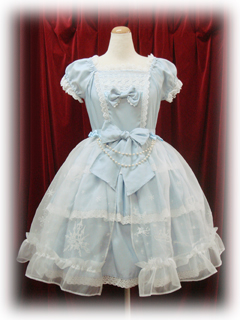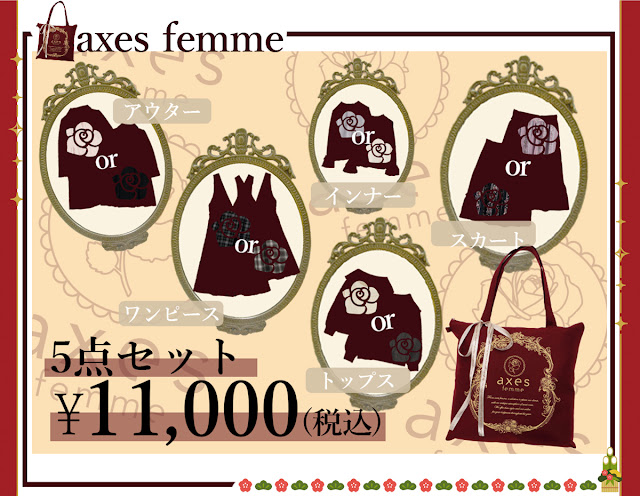An introduction to oldschool lolita
Most people, when they get into lolita, gravitate towards either sweet or gothic lolita. I was a bit of an odd little duck in the group because I immediately started out with a love for oldschool, a style that at the time was hardly known. A few years later, oldschool has become more popular once more (I suspect as a countermovement against the insane peaks OTT classic has reached), yet a lot of people still can't recognize it. A friend of mine thought "oldschool" simply referred to anything black and white, another thought it meant nonprint dresses. So I thought I'd write a post about what oldschool is, what its defining features are, for anyone who is interested in this style but has a hard time grasping the subtle aspects that make a coord truly oldschool.
At its core, oldschool is a substyle heavily based on what lolita looked like from 2000 to around 2006. There are hardly any prints, the ones that are there are appliques and don't usually wrap around the skirt like a modern border print. The interest comes not from a flashy print but from construction and yards upon yards of thick, cotton, usually black or white lace. Nearly always cotton, sometimes rashel, but never metallic or tulle. Tulle lace wasn't used for years, cotton was top dog instead. Therefor, lace material can decide whether a dress looks 2002 or 2012 and thus whether it's suitable for oldschool.
 |
| This was considered OTT in 2006! |
lolita" because of how "unwearable" it was. The nice part of this all is that it means oldschool is very easily washable! Just chuck it in the washing machine, no need to worry about snagging delicate fabrics or breaking little charms or prints running.
Coording an oldschool dress is very easy too, the rule of thumb is a headpiece and bag in the main colour of your dress or skirt, then blouse and socks in the colour of its lace, and black or white shoes regardless of dress colour. As long as the pieces used have an oldschool look to them and you *somewhat* follow this rule of thumb, it's nearly impossible to end up with a bad outfit.
Dresses
 |
| Look at those heaps of lace! |
 |
| Early Angelic Pretty dress w/ faux blouse |
A design feature that was very popular back then but has completely died out since was the fake blouse.
People wore a lot of blouses under onepiece dresses, so much so that brands started to create dresses with faux blouses underneath in the form of detachable sleeves and a collar in a contrasting colour. Detachable sleeves in themselves were a big trend too, because of their ease of wearing (two blouses in one!) and because of their delightfully chunky look. They came on blouses as well as OP's and could sometimes be mixed and matched. Brands even occasionally sold loose sleeves! This trend, too, died out overtime.
People wore a lot of blouses under onepiece dresses, so much so that brands started to create dresses with faux blouses underneath in the form of detachable sleeves and a collar in a contrasting colour. Detachable sleeves in themselves were a big trend too, because of their ease of wearing (two blouses in one!) and because of their delightfully chunky look. They came on blouses as well as OP's and could sometimes be mixed and matched. Brands even occasionally sold loose sleeves! This trend, too, died out overtime.
As for colours and prints, they were surprisingly different. Sure, pink, sax, red and black were all there, but colours that are now common like royal blue, mint green and lavender were missing. Colours like these aren't some kind of oldschool faux pas, they're just not around a lot. If you search hard you can sometimes find one, but they're far from common.
Patterned dresses were made, but instead of border prints, they were all-over prints, often tartan, berries or florals and quite often grandma's couch-style floral.
 |
| That collar! Those sleeves! All that lace! |
oldschool blouses are big full-length bell sleeves, often piled with more lace. I personally love them, they're so frilly and decadent!
Also, while nowadays mostly ignored, cutsews used to be huge. They came in lacy or printed variety and were usually worn with skirts for a cute and sometimes nearly punky look.
Headwear
The number one headpiece associated with oldschool is the rectangle headdress (also unceremoniously named the "maxipad headdress"). There are other options too, like big headbows, little crowns, bonnets, small bows on combs and canotiers, but nothing screams "oldschool" quite like a ruffly rectangle headpiece. They've gotten a bit more popular recently but the new designs have lost the typical shape and detailing and are therefor not oldschool anymore. Regardless of that, I'm happy they got a little life back, I love them to death!
 |
| A very modern rectangle headdress on the left (note the tulle lace, gauzy ribbon and crisscrossing pearls) versus the old kind that started it all! |
Undergarments
Petticoatwise nothing really changed, aside from petticoats getting significantly poofier, but bloomers got a LOT shorter. Another trend that slowly died off was wearing very long bloomers with lace edges that peeked from the edge of your dress. Over the knee-socks were relatively rare, most people wore either lace-topped kneesocks or striped socks. Printed socks did not exist yet. A fun little touch some lace-topped socks had/have is a functional ribbon beaded through the lace top that you can tighten and tie, like a garter. No more dropping sock struggles!Shoes
 |
| Vivienne Westwood rocking horse shoes |
While nowadays shoes come in a myriad of colours to match
your every dress, shoes in the oldschool era were practically always
plain black or white. Shoes of choice were either delicate little mary
janes, big chunky platforms or rocking horse shoes- the much beloved
bow-adorned strappy shoes didn't enter the lolita scene until Angelic
Pretty started making border prints. Personally I think it's nice because it
means you can pick up suitable shoes at other places than just
lolita-specific shops. Regular stores will be bound to carry some simple
black mary janes, and every self-respecting goth brand will have put
out black platforms at one point or another! Rocking horse shoes are the
only ones that are a bit tricky to lay your hands on since a lot of the
brands that used to make them have since quit. These days it's
an*tai*na, BTSSB or Vivienne Westwood, the latter two being pretty
pricy.
Bags
Bags were not at all what they are today. Oldschool bags were very simple, usually a square purse with a small adornment or logo on the front, a tote bag, or a simple matching cloth bag. *Some* novelty bags did exist, but they were pretty much limited to hearts or trump shapes and they were pretty uncommon.
---
That's about it! Quite a list! Oldschool is a very specific style after all. Or rather a way of wearing, as really any substyle of lolita can be made oldschool, it's pretty flexible. Therefor you should have fun and experiment with it! I wrote down some guidelines here of what is the typical view of oldschool lolita, but don't use it as a set of iron rules. Use it as a base to create your own outfits with, and make them fully yours. Have fun with it!





Comments
Post a Comment